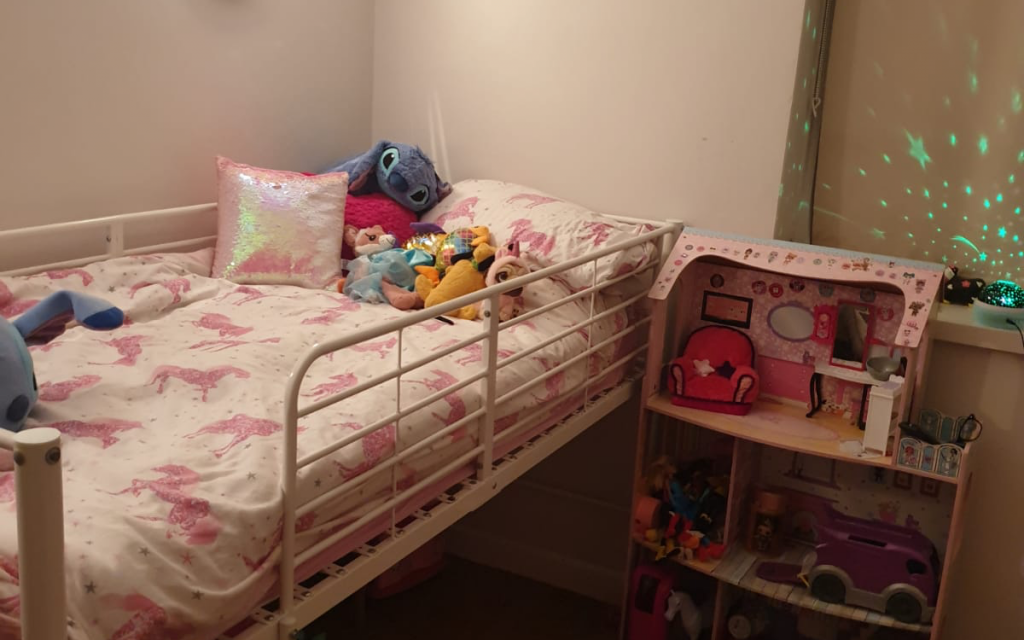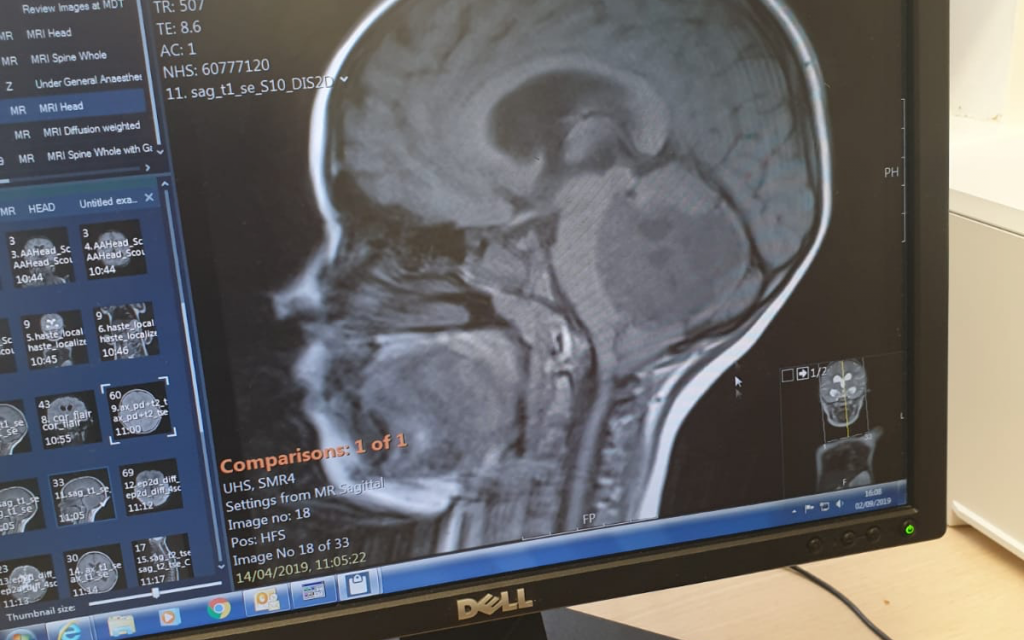Every parent has a magical memory of teaching your child to ride a bike and that first wobbly solo captured in a photo or on film. But Shelley Dunlop gave up on this milestone with her daughter Annabelle Ginn as she kept toppling off her bike.
“We did our best to get her on a bike but we got nowhere as her balance was just so bad,” she said.
“She couldn’t even ride a scooter without falling off so we gave up on both.



“And from as long as I can remember, Annabelle has been incredibly clumsy. She was always tripping – she’d manage to stumble over nothing on a flat floor. It got worse when she started school and she’d come home with an accident form most days. One teacher nicknamed her Little Miss Bump and another suggested we get her tested for dyspraxia, which was on my to-do list.
“She’s always been a bubbly, chatty, happy little girl and we didn’t think anything of it – we just thought she was a clumsy kid.”
But after Annabelle fell out of her cabin bed and three days later started suffering excruciating headaches and vomiting, a scan revealed a tennis-ball sized brain tumour.

Doctors told the shocked mother that it had probably been growing for years and was the cause of Annabelle’s balance problems.
They said that falling out of bed had probably caused fluid on her brain to build up, which triggered the headaches and sickness.
“Thank goodness Annabelle fell out of bed – I’m convinced it saved her life as it led to her diagnosis,” said Shelley, 30, a health care assistant from Dorset.
“You hear the words, ‘your child has a brain tumour,’ and you just can’t take it in. It was surreal and I couldn’t register this was happening to my little girl – it felt like I was watching a TV show. All the time we’d thought she was just clumsy, she was walking around with a ticking time bomb inside her head.”
After a 10-hour operation to remove the tumour, Annabelle was in hospital for a month as she had to learn how to walk and talk again.
Eight months on, she has been left with weakness on her left side and impaired vision in her left eye, but is back at school full-time.



And she is sharing their story through The Brain Tumour Charity to support its HeadSmart campaign to raise awareness of children’s brain tumour symptoms and reduce diagnosis time.
“We didn’t have a clue that poor balance was a possible symptom of a brain tumour,” said Shelley.
“If we had, Annabelle would probably have been diagnosed earlier and her tumour wouldn’t have grown so big and caused as much damage.”
The family’s nightmare started on April 9 when Shelley and her partner Troy, 31, were downstairs when they head a crash from Annabelle’s bedroom around 7pm.
“We ran into Annabelle’s room and she was on the floor holding her head,” said Shelley.
“She said she’d hit it when she fell out of bed trying to shut her blinds. We checked her over for bumps and cuts and she said she was OK, so I gave her a cuddle and tucked her back in bed.”
Next day, Annabelle seemed fine but three days later, she woke up with a headache and got sick,
“I took her to a GP who said it was most likely due to bruising from the fall and sent us away,” said Shelley.
Next morning, Annabelle woke up with a headache and vomited again, so Shelley took her to The Royal Bournemouth Hospital where she works.
“She was under observation and a doctor said she had concussion and was going to send her home with Calpol,” she said.
“Then Annabelle had a headache and they saw for themselves how much pain she was in.”

Doctors decided Annabelle needed a CT scan and sent her to Poole Hospital, which has a paediatric unit.
After a five-hour wait in A & E, Annabelle had the scan.
“By then, I was by myself as Troy had to go back to work, “said Shelley.
“As soon as a nurse asked me to go into another room, I knew something was seriously wrong.
“Doctors told me that Annabelle had a large tumour near her brain stem. They said she had to be transferred immediately to University Southampton Hospital’s paediatric neurology department for a more detailed MRI scan. I’d been convinced they were going to say she had concussion and send me home with an information leaflet – not turn our world upside down in seconds. I had so many questions racing through my mind that I was scared to ask, but I made myself ask: “Is she going to die?’
“I was terrified.”
Shelley rang her Annabelle’s dad, her ex-partner, Alfie, to break the news and he met her to travel in the ambulance with their little girl to Southampton. I was in tears while Annabelle wolfed down a packet of crisps as she hadn’t had any dinner,” said Shelley.
“She looked fine so I couldn’t take it in she had a brain tumour.
”When she asked, ‘Mummy, why are you crying?’ I told her I’d stubbed my toe.”
Next day, Annabelle’s MRI confirmed that she had a brain tumour.
“I felt sick when we saw the scan and the lump a size of a tennis ball in my little girl’s brain,” said Shelley.
Next morning, Annabelle had surgery and Shelley went down to theatre with her.
“Watching her being put to sleep on the table knowing she might not make it or not wake up the little girl I knew was the hardest thing I’ve ever done,” she said.
Annabelle was in theatre for 10 hours.
“It felt like an eternity,” said Shelley.
Finally, she was told Annabelle was in recovery in the intensive care unit.
“She had wires everywhere, including a drain allowing fluid to drain from her brain,” said Shelley.
She suffered another devastating blow when doctors explained Annabelle had posterior fossa syndrome – a condition sometimes caused after surgery to the cerebellum – causing paralysis down the left side of her body.



“She couldn’t move, speak or swallow for five days,” said Shelley.
“Her dad and I hardly left her side. Our six-year-old had reverted to a new born state and had to have a feeding tube. To start with, all she did was cry or throw up. It broke my heart to see my giggly little chatterbox just sitting there with a blank look on her face and no expression in her eyes. She looked empty.”
Another MRI scan showed surgeons had removed most of the tumour.
Biopsy results later revealed it was a grade one (non-cancerous) pilocytic astrocytoma.
“We were so relieved Annabelle’s tumour wasn’t cancerous and felt like we’d won an unlucky lottery,” said Shelley.
Back on the ward, Annabelle started her rehabilitation.
Shelley communicated with her using a thumbs up or thumbs down, and the little girl’s condition improved slowly thanks to physio and occupational therapists.
Annabelle’s first achievement was being able to roll over by herself, then sit up with help, itch her nose and sit up on her own.
Poignantly, she had to go through all her “firsts” again.
“Annabelle had to relearn her first steps, first words and first time using the toilet,” said Shelley.
“It’s something no parent should ever have to go through. But there were some precious “firsts” too. The first time she said ‘I love you, Mummy’ again was incredible and so emotional,” said Shelley.
“And another magical moment was when she was able to smile again. Of course what Annabelle remembers most is being able to eat again when we took her out in a wheelchair for her favourite Subway lunch.”
Back at home, Annabelle – who now has scans every six months – went back to school part-time in June and was full-time by September.
“She still wears a patch to correct double vision in her left eye caused by nerve damage in surgery,” said Shelley.
“We take her wheelchair most places as she still gets very tired. Annabelle is more introverted and not as laid back as she was before surgery. She’s still having physio and seeing a psychiatrist, but considering everything she’s been through, she’s doing brilliantly. We’re slowly but surely getting back our feisty little girl who loves Netflix, playing chess and her puppy Evee.
“And we’re going to give her the best Christmas ever and have planned trips to Winter Wonderland and Disney on Ice in London – I can’t wait to see her face light up.”
Now Shelley cherishes every second with her daughter. “We’re among the lucky ones as Annabelle’s future looks hopeful,” she said.
“I am so proud of her and every day I count my blessings we’ve got her.”

“We are so sorry Annabelle and her family have been through such an ordeal.
“And we are incredibly grateful to Shelly for sharing her gorgeous little girl’s story to help us raise awareness about our HeadSmart campaign.
“Annabelle’s experience highlights how symptoms like balance problems can possibly be a warning sign of a brain tumour, especially when linked to other symptoms like persistent headaches and vomiting.
“HeadSmart has two aims: to save lives and reduce long-term disability by bringing down diagnosis times.
Sarah Lindsell, CEO, The Brain Tumour Charity
Interview: Carol Dyce. Originally published on The Daily Mail
